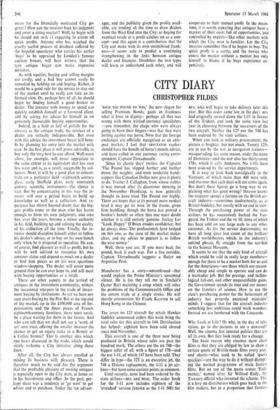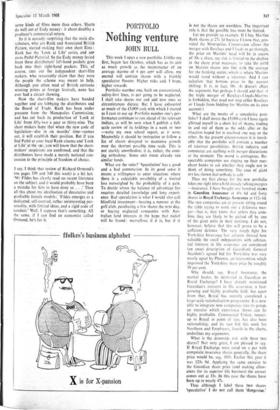CITY DIARY
CHRISTOPHER FILDES
`BACK THE POUND TO WIN,' the new slogan for selling Premium Bonds, gains in frankness what it loses in dignity: perhaps all that was wrong with those wicked currency speculators —you remember, the chaps who were always going to burn their fingers—was that they were betting against our horse. Now that the foreign exchanges are officially recognised as an ante- post market, I feel that SPECTATOR readers should have the benefit of horse's-mouth advice, and have called in our currency racing corre- spondent, Captain Threadneedle.
`Since its classic days' (writes the Captain) `The Pound has slipped further and further down the weights; and even moderate handi- cappers like Canadian Dollar now give it plenty to do. Trainer J. Callaghan, from whose stables it was moved after its disastrous showing in the November Handicap, is now generally thought to have tried The Pound too highly. There are hopes that at its present more modest level it may get its nose in the frame, given firm handling, though the horse has proved a bookie's benefit so often that one must doubt whether it is still entirely genuine. Jockey Les "Look Happy" O'Brien exudes confidence, but he always does. The professionals have hedged on this one, as the state of the market makes clear, and my advice to punters is to follow the wise money.'
Well, there you are. If you must back the pound, back it each way. For a live outsider, Captain Threadneedle suggests a flutter on Argentine Peso.
Manchester has a story—unconfirmed—that would explain the Prime Minister's unwonted silence. He is (so they tell me in Sinclair's Oyster Bar) maturing a coup which will solve the problems of the Commonwealth Office and the cotton trade at a single stroke. He will shortly commission Sir Frank Kearton to sell Hong Kong to the Chinese.
The seven Hs 125 aircraft for which Hawker Siddeley announced orders this week bring the total sales for this aircraft to 144. Devaluation has helped: eighteen have been sold abroad since mid-November.
This aircraft is one of the three now being produced in Britain whose sales are past the hundred mark. The others are, the Hs 748—the biggest seller of all, with a figure of 178—and the BAC 1-11, of which 147 have been sold. They differ in type—the 125 is an executive jet, the 748 a Dakota replacement, the 1-11 a jet air- liner—but have some curious points in common. Until recently, none had been ordered by the state airlines—BEA and BOAC. The order book for the 1-11 now includes eighteen of the `stretched' version (known as the 1-11 500) for BEA, who will begin to take delivery later this year. But this order came late in the day: BEA had originally turned down the 1-11 in favour of the Trident, and took the same view last year in choosing between the successors of the two aircraft. Neither the 125 nor the 748 has been ordered by the state airlines.
When you look at military procurement, the picture is brighter, but not much. Twenty 125s are in use by the RAF as navigation trainers— masquerading, for some reason, under the name of Dominies—and the RAF also has thirty-seven 178s, which it calls Andovers. No 1-11s have been ordered by the service departments.
It is easy to look back nostalgically to the Viscount, of which more than 400 were sold, and murmur that such days will not come again. But don't these figures go a long way to ex- plaining what has gone wrong? Heaven knows the taxpayer spends a fortune on the British air- craft industry—sometimes inadvertently, as at Bristol-Siddeley, but mostly with an end in view. Through the purchasing power of the state airlines, he has successively backed the Van- guard, the Trident and the vc 10; none of which has been sold on any large scale to any other customer. As for the service departments, we have all long since lost count of the brilliant British world-beaters which, in the industry's unkind phrase, fly straight from the test-bed to the Science Museum.
It seems to me that the only kind of aircraft which could be sold in really large numbers— enough for there to be a market both for us and for the Americans—are those which are reason- ably cheap and simple to operate and can do a workaday job. But for prestige, and techno- logical fall-out, and other unquantifiable gains, the Government spends its time and our money on the frontiers of science. How to use the state's purchasing power for the betterment of industry has properly exercised ministers' minds. I suggest that for the aircraft industry something less ambitious could work wonders. Instead we are lumbered with the Concorde.
Why Look at Life? Or why, in the day of tele- vision, go to the pictures to see a newsreel? Well, the cinema has internal politics that are all its own. But they look ready for a change.
The basic reason why cinemas show short films is that they are obliged by law to show a certain quota of British-made films every year, and shorts—what used to be called 'quota quickies'—are the way to do it without disrupt- ing the normal programme of main feature films. But on top of the quota comes Tady money,' named after Sir Wilfred Eady, the Treasury official who invented the scheme. This is a levy on distributors which goes back to the film makers, but in a proportion that favours
some kinds of films more than others. Shorts do well out of Eady money: it about doubles a producer's commercial return.
So it is scarcely surprising that the main dis- tributors, who are Rank and Associated British Picture, started making their own short films: Rank has the 'Look at Life' series, and ABP owns Pattie Pictorial. So the Eady money levied from these distributors' left-hand pockets goes back into their right-hand pockets. This, of course, cuts out the independent short-film makers, who reasonably claim that they were the people the scheme was meant to help. Although you often read of British cartoons winning prizes at foreign festivals, none has ever had a circuit showing.
Now the short-film makers have banded together and are lobbying the distributors and the Board of Trade. Rank has been under pressure from the Monopolies Commission; and has cut back its production of 'Look at Life' from fifty-two a year to thirty-nine. The short makers hope that when the new code of legislation—due in six months' time—comes out, it will establish their position. But if you find Pattie at your local Rank cinema and 'Look at Life' at the ABC, you will know that the short- makers' suspicions are confirmed, and that the distributors have made a merely notional con- cession to the principle of freedom of choice.
I say, I think that review of Richard Ormond's (on pages 339 and 340 this week) is a bit hot. 'Mr Fildes has clearly read no recent literature on the subject, and it would probably have been a mistake for him to have done so . . .' Then all this about my idealisation of decorative and profitable female models: 'Fildes emerges as a dedicated, self-centred, rather uninteresting per- sonality, with limited ideas, and a rigid code of conduct.' Well, I suppose that's something. All the same, if I can find an economist called • Ormond, he's for it.











































 Previous page
Previous page